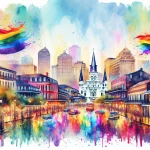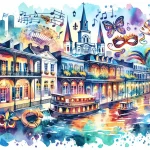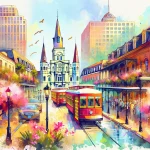Situated along the Mississippi River, New Orleans stands out as the birthplace of jazz, a quintessentially American musical genre. Emerging in the early 20th century, jazz absorbed the rich cultural influences of the city’s African American and Creole communities. With its infectious rhythms, improvisational spirit, and emotional depth, jazz rapidly captivated music lovers worldwide, solidifying New Orleans’ reputation as a musical mecca.
In This Article
TL;DR
- Jazz originated in New Orleans in the early 1900s, influenced by African American and Creole musical traditions.
- Legendary figures like Louis Armstrong, Jelly Roll Morton, and Sidney Bechet played pivotal roles in shaping the city’s jazz scene.
- New Orleans hosts festivals and events that celebrate and preserve the city’s rich jazz heritage.
Historical Context of Jazz in New Orleans
The origins of jazz in New Orleans can be traced back to the late 19th and early 20th centuries, when the city served as a melting pot of cultures, blending African, Caribbean, European, and American influences. The African American communities, particularly in the Tremé neighborhood, played a crucial role in the development of jazz. The music that emerged from these communities fused elements of ragtime, blues, spirituals, and marches, creating a distinctly American sound.
Creole culture also had a significant impact on the evolution of jazz in New Orleans. Creole musicians, known for their formal musical training and ability to read music, brought a level of sophistication to the genre. The fusion of African American and Creole musical traditions gave birth to the early jazz style known as “New Orleans jazz” or “Dixieland jazz.”
As jazz gained popularity, many musicians from New Orleans began to migrate to other cities, such as Chicago and New York, in search of better opportunities. This migration helped spread the influence of New Orleans jazz across the United States and beyond.
Key Figures in the Development of New Orleans Jazz
Louis Armstrong
A renowned trumpeter and vocalist who rose from poverty in New Orleans to become an international icon, spreading the popularity of jazz worldwide.
Jelly Roll Morton
A pianist, composer, and arranger who claimed to have invented jazz. Morton’s contributions to the genre, particularly in terms of composition and arrangement, were significant.
Sidney Bechet
A virtuoso clarinetist and saxophonist who was one of the first jazz musicians to gain recognition outside of New Orleans.
King Oliver
A cornetist and bandleader who mentored Louis Armstrong and helped establish Chicago as a major center for jazz in the 1920s.
Iconic Jazz Venues in New Orleans
New Orleans boasts numerous historic venues that have contributed to the city’s rich jazz culture. One of the most famous is Preservation Hall, located in the French Quarter. Established in 1961, Preservation Hall has been a sanctuary for traditional New Orleans jazz, featuring nightly performances by legendary local musicians.
Another iconic venue is The Spotted Cat Music Club, situated on the lively Frenchmen Street. This intimate club showcases live jazz, blues, and funk performances, attracting both locals and tourists alike. The Spotted Cat is known for its authentic New Orleans atmosphere and dedication to preserving the city’s musical heritage.
Other notable jazz venues in New Orleans include:
- Snug Harbor Jazz Bistro
- Palm Court Jazz Cafe
- Fritzel’s European Jazz Club
The Role of Festivals and Events in Promoting Jazz
New Orleans hosts several major jazz festivals throughout the year, attracting music enthusiasts from around the globe. The most prominent event is the New Orleans Jazz & Heritage Festival, commonly known as “Jazz Fest.” This annual celebration, typically held in late April and early May, features a diverse lineup of jazz, blues, R&B, gospel, and world music acts across multiple stages.
Jazz Fest not only showcases the talents of local musicians but also brings in renowned international artists, making it a significant economic and cultural event for the city. The festival draws hundreds of thousands of visitors each year, contributing to the local economy and helping to sustain the popularity of jazz music.
Other notable jazz events in New Orleans include:
Jazz Education and Preservation Efforts
New Orleans is home to several institutions and organizations dedicated to preserving and promoting jazz music. The New Orleans Jazz Museum, located in the historic Old U.S. Mint building, houses extensive collections of jazz artifacts, photographs, and recordings. The museum also hosts educational programs, concerts, and workshops, serving as a vital resource for jazz enthusiasts and scholars.
Other notable jazz education and preservation efforts in New Orleans include:
- The New Orleans Center for Creative Arts (NOCCA)
- The Preservation Hall Foundation
- The Louis Armstrong Educational Foundation
These institutions and organizations play a crucial role in ensuring that the rich legacy of New Orleans jazz is passed down to future generations, keeping the music relevant and vibrant.
Experiencing Jazz Today in New Orleans
For visitors looking to immerse themselves in the city’s jazz scene, there are countless opportunities to experience live performances. Frenchmen Street, located just outside the French Quarter, is a hub for jazz clubs and live music venues. Visitors can stroll along the street and pop into various clubs to enjoy a wide range of jazz styles, from traditional to contemporary.
Some of the best times to experience jazz in New Orleans include:
- Evenings: Many jazz clubs and venues feature live performances nightly, with shows typically starting around 8 pm.
- Weekends: Friday and Saturday nights tend to be the busiest times for live music, with many venues offering multiple shows per evening.
- During festivals: Jazz Fest, French Quarter Festival, and Satchmo SummerFest provide ample opportunities to enjoy live jazz performances throughout the day and night.
To fully engage with the local jazz community, visitors can attend jam sessions, workshops, and masterclasses offered by various venues and organizations. These events provide a chance to interact with local musicians, learn about the history and techniques of jazz, and even participate in the music-making process.
Economic and Cultural Impact of Jazz on New Orleans
Jazz has had a profound impact on the economy and culture of New Orleans. The city’s reputation as the birthplace of jazz attracts millions of visitors each year, contributing significantly to the local tourism industry. Jazz clubs, festivals, and other music-related events generate revenue for businesses, create jobs, and support the livelihoods of local musicians.
Beyond its economic impact, jazz is deeply ingrained in the identity of New Orleans. The music is a source of pride for residents, reflecting the city’s resilience, creativity, and cultural diversity. Jazz has influenced various aspects of New Orleans life, from the culinary scene to the visual arts and literature.
As New Orleans continues to evolve and face new challenges, jazz remains a vital part of the city’s cultural heritage. The ongoing efforts to preserve and promote jazz ensure that this unique art form will continue to thrive, attracting new generations of musicians and enthusiasts while serving as a testament to the enduring spirit of New Orleans.






